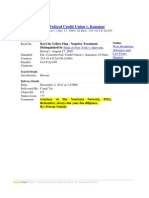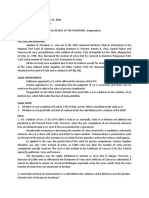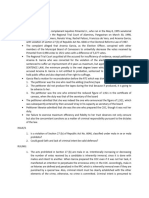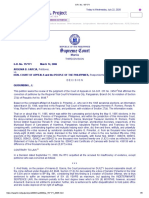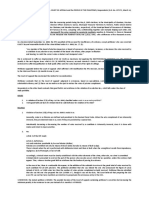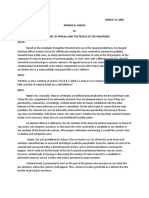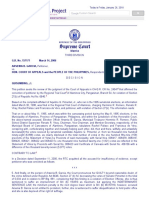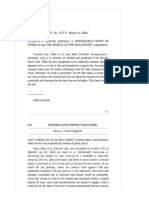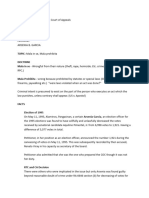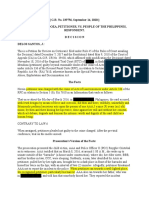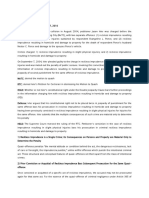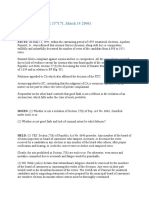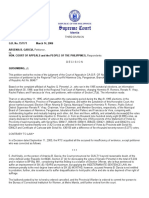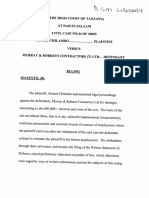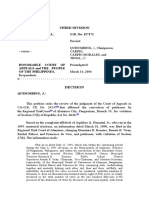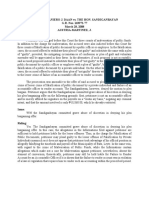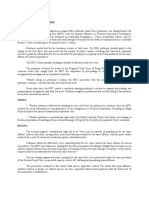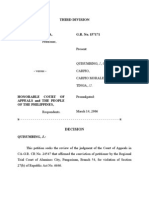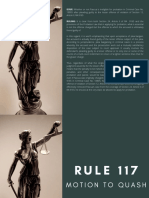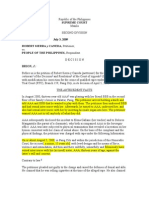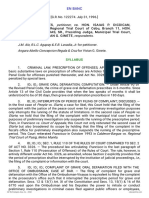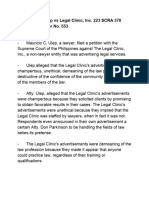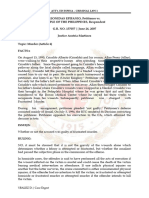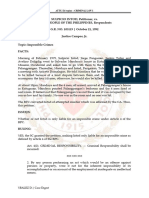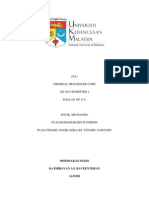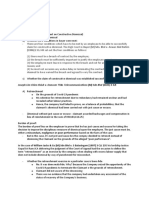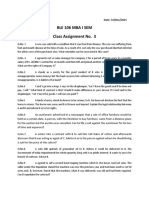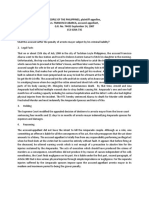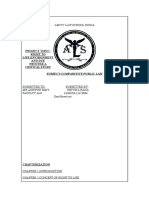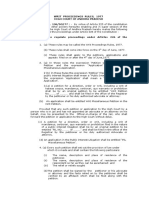Case Digest - Garcia v. CA
Case Digest - Garcia v. CA
Uploaded by
Dawn YbalezCopyright:
Available Formats
Case Digest - Garcia v. CA
Case Digest - Garcia v. CA
Uploaded by
Dawn YbalezCopyright
Available Formats
Share this document
Did you find this document useful?
Is this content inappropriate?
Copyright:
Available Formats
Case Digest - Garcia v. CA
Case Digest - Garcia v. CA
Uploaded by
Dawn YbalezCopyright:
Available Formats
ATTY.
ED ESPINA – CRIMINAL LAW 1
ARSENIA GARCIA, Petitioner, vs.
CA and PEOPLE OF THE PHILIPPINES, Respondents
G.R. NO. 157171 | March 14, 2006
Justice Quisumbing
Topic: Definition of Felony (Article 3)
FACTS:
Aquilino Pimentel, Jr., who ran in the 1995 senatorial elections, filed a case before the
RTC of Alaminos against Arsenia Garcia and four others for violation of RA 6646,
Section 27(b). In a Decision dated September 11, 2000, the RTC acquitted all the
accused for insufficiency of evidence, except petitioner Garcia who was convicted
and found guilty beyond reasonable doubt of the crime defined under RA 6646,
Section 27(b) for decreasing the votes of Senator Pimentel and violation of Election
Offense.
Petitioner appealed before the CA which affirmed with modification the RTC
decision. The CA likewise denied the motion for reconsideration. Hence, this appeal.
ISSUE/S:
1. Whether or not a violation of Section 27(b) of RA 6646, classified under mala
in se or mala prohibita.
2. Whether or not good faith and lack of criminal intent be valid defenses for
violation of RA 6646.
RULING:
1. Violation of Section 27(b) of RA 6646 is mala in se because the acts
complained of is inherently immoral. Accordingly, criminal intent must be
clearly established with the other elements of the crime; otherwise, no crime is
committed. Intentionally increasing or decreasing the number of votes
received by a candidate is inherently immoral, since it is done with malice
and intent to injure another.
As between the grand total of votes alleged to have been received by private
complainant of 6,921 votes and statement of his actual votes received of 6,998
is a difference of 77 votes. The discrepancy may be validly attributed to
mistake or error due to fatigue. However, a decrease of 5,000 votes as
reflected in the Statement of Votes and Certificate of Canvass is substantial, it
cannot be allowed to remain on record unchallenged, especially when the
error results from the mere transfer of totals from one document to another.
YBALEZ D.| Case Digest
ATTY. ED ESPINA – CRIMINAL LAW 1
2. Good faith and lack of criminal intent is a valid defense for violations of RA
6646 however the burden of proof rests in the person invoking it. Criminal
intent is presumed to exist on the part of the person who executes an act
which the law punishes, unless the contrary shall appear. Thus, whoever
invokes good faith as a defense has the burden of proving its existence.
In the case at bar, petitioner admitted that she was indeed the one who
announced the figure and prepared the COC (Exhibit A-7), though it was not
her duty. The Court believed that preparing the COC even if it was not her
task, manifests an intention to perpetuate the erroneous entry in the COC.
PRINCIPLES/DOCTRINE:
Criminal Law; Mala in Se and Mala Prohibita Distinguished.—Generally, mala in
se felonies are defined and penalized in the Revised Penal Code. When the acts
complained of are inherently immoral, they are deemed mala in se, even if they are
punished by a special law. Accordingly, criminal intent must be clearly established
with the other elements of the crime; otherwise, no crime is committed. On the other
hand, in crimes that are mala prohibita, the criminal acts are not inherently immoral
but become punishable only because the law says they are forbidden. With these
crimes, the sole issue is whether the law has been violated. Criminal intent is not
necessary where the acts are prohibited for reasons of public policy.
Mala in Se; Election Law; Acts prohibited in Section 27(b) of Republic Act No. 6646
are mala in se. Intentionally increasing or decreasing the number of votes received
by a candidate is inherently immoral, since it is done with malice and intent to injure
another. Criminal intent is presumed to exist on the part of the person who executes
an act which the law punishes, unless the contrary shall appear.
YBALEZ D.| Case Digest
You might also like
- CRIM - Garcia Vs Court of Appeals, G.R. No. 157171Document2 pagesCRIM - Garcia Vs Court of Appeals, G.R. No. 157171KJPL_1987100% (2)
- Simple Guide for Drafting of Civil Suits in IndiaFrom EverandSimple Guide for Drafting of Civil Suits in IndiaRating: 4.5 out of 5 stars4.5/5 (4)
- Sample Copy CREWMAN B 2009Document18 pagesSample Copy CREWMAN B 2009Vicmel Diaz0% (1)
- Pacific Concrete Federal Credit Union V KauanoeDocument22 pagesPacific Concrete Federal Credit Union V Kauanoeprosper4less8220No ratings yet
- Local Budget ProcessDocument58 pagesLocal Budget ProcessAricirtap Abenoja JoyceNo ratings yet
- Case Digest - Garcia VS CaDocument2 pagesCase Digest - Garcia VS CaDawn YbalezNo ratings yet
- Garcia vs. CADocument2 pagesGarcia vs. CAreginaNo ratings yet
- Garcia VS Ca Case DigestDocument2 pagesGarcia VS Ca Case DigestAngel Monique VillapazNo ratings yet
- Garcia v. CA, G.R. No. 157171, March 14, 2006Document2 pagesGarcia v. CA, G.R. No. 157171, March 14, 2006DYbieNo ratings yet
- Garcia v. People, GR 157171Document5 pagesGarcia v. People, GR 157171Ashley Kate PatalinjugNo ratings yet
- Garcia Vs CA - Digest For Crim LawDocument1 pageGarcia Vs CA - Digest For Crim LawjdsantosannaNo ratings yet
- Garcia Vs CADocument2 pagesGarcia Vs CASophiaFrancescaEspinosaNo ratings yet
- Garcia V CA, G.R. No. 157171, March 14, 2000Document6 pagesGarcia V CA, G.R. No. 157171, March 14, 2000Lika MejidoNo ratings yet
- Garcia v. CA Case Digest by Xi TorianoDocument1 pageGarcia v. CA Case Digest by Xi TorianoHANNAH GRACE TEODOSIONo ratings yet
- Garcia vs. CADocument2 pagesGarcia vs. CAJoseph AbadianoNo ratings yet
- Garcia V CADocument1 pageGarcia V CAKath100% (3)
- Garcia Vs CADocument6 pagesGarcia Vs CAgrelvanelliNo ratings yet
- Arsenia Garcia vs. Honorable Court of AppealsDocument6 pagesArsenia Garcia vs. Honorable Court of AppealsSarah BuendiaNo ratings yet
- G.R. No. 157171, Arsenia B. Garcia vs. Court of Appeals, March 14, 2006Document2 pagesG.R. No. 157171, Arsenia B. Garcia vs. Court of Appeals, March 14, 2006Amicus CuriaeNo ratings yet
- #04 G.R. No. 157171Document5 pages#04 G.R. No. 157171Fe Myra LagrosasNo ratings yet
- Garcia v.CADocument2 pagesGarcia v.CAJaime NikolaiNo ratings yet
- G.R. No. 157171Document6 pagesG.R. No. 157171grethelloyolaNo ratings yet
- 121917-2006-Garcia v. Court of Appeals20180327-1159-1ix2oaa PDFDocument6 pages121917-2006-Garcia v. Court of Appeals20180327-1159-1ix2oaa PDFLeona SanchezNo ratings yet
- Garcia Vs Court of AppealsDocument2 pagesGarcia Vs Court of AppealsIra AgtingNo ratings yet
- Garcia vs. Court of Appeals, 484 SCRA 617 (2006)Document1 pageGarcia vs. Court of Appeals, 484 SCRA 617 (2006)saminahNo ratings yet
- Digested Cases LegpracDocument4 pagesDigested Cases LegpracRey Almon Tolentino AlibuyogNo ratings yet
- Case Study3Document4 pagesCase Study3Lorielle May AranteNo ratings yet
- Garcia V CA G.R. No. 157171Document6 pagesGarcia V CA G.R. No. 157171Vince Paul RubiNo ratings yet
- Garcia V CADocument10 pagesGarcia V CAKarlo KapunanNo ratings yet
- Case Digest Arsenia Garcia v. Honorable Court of Appeals March 14 2006Document2 pagesCase Digest Arsenia Garcia v. Honorable Court of Appeals March 14 2006SFANNo ratings yet
- Garcia V CA GR No. 157171Document2 pagesGarcia V CA GR No. 157171Duko Alcala EnjambreNo ratings yet
- Garcia vs. Court of AppealsDocument39 pagesGarcia vs. Court of AppealsChatNo ratings yet
- Garcia Vs CA and People March 14, 2006Document20 pagesGarcia Vs CA and People March 14, 2006Zyki Zamora LacdaoNo ratings yet
- Notes To Crim Law and DigestsDocument20 pagesNotes To Crim Law and DigestsJulio Ceazar SedanoNo ratings yet
- Garcia vs. CA Full TextDocument12 pagesGarcia vs. CA Full TextganneborjaNo ratings yet
- Mendoza Va PeopleDocument8 pagesMendoza Va PeopleoabeljeanmoniqueNo ratings yet
- Crim Pro DigestDocument10 pagesCrim Pro DigestFrancess Mae AlonzoNo ratings yet
- Garcia v. Ca Case DigestDocument2 pagesGarcia v. Ca Case Digestkent kintanarNo ratings yet
- Full Case Brief Crim 1Document111 pagesFull Case Brief Crim 1AngelNo ratings yet
- G.R. No. 157171 March 14, 2006 ARSENIA B. GARCIA, Petitioner, Hon. Court of Appeals and The People of The Philippines, RespondentsDocument6 pagesG.R. No. 157171 March 14, 2006 ARSENIA B. GARCIA, Petitioner, Hon. Court of Appeals and The People of The Philippines, RespondentsAnafer BautistaNo ratings yet
- PILONEO - 6 - G.R. No. 229781Document4 pagesPILONEO - 6 - G.R. No. 229781Francess PiloneoNo ratings yet
- Chilambo Vs Murray Roberts Contractors (T) LTD (Civil Case 44 of 20005) 2005 TZHC 56 (9 November 2005)Document7 pagesChilambo Vs Murray Roberts Contractors (T) LTD (Civil Case 44 of 20005) 2005 TZHC 56 (9 November 2005)Prince PaziNo ratings yet
- Criminal IntentDocument67 pagesCriminal IntentKrisven Mae R. ObedoNo ratings yet
- 5.2 Pimentel v. Llorente, 339 SCRA 154 (2000)Document8 pages5.2 Pimentel v. Llorente, 339 SCRA 154 (2000)april rose ticarNo ratings yet
- Crim Law CasesDocument15 pagesCrim Law CasesYeshua TuraNo ratings yet
- Reyes, Christian Emil B. - Week 10Document3 pagesReyes, Christian Emil B. - Week 10Christian Emil B. ReyesNo ratings yet
- Garcia Vs CA G.R. No. 157171Document2 pagesGarcia Vs CA G.R. No. 157171Nikay SerdeñaNo ratings yet
- Digested Cases LegpracDocument4 pagesDigested Cases LegpracRey Almon Tolentino AlibuyogNo ratings yet
- Criminal Law Exempting CircumstancesDocument129 pagesCriminal Law Exempting CircumstancesYlourah SarmientoNo ratings yet
- Ivler VsDocument7 pagesIvler VsRafael AdanNo ratings yet
- Arsenia B. Garcia, G.R. No. 157171: Third DivisionDocument13 pagesArsenia B. Garcia, G.R. No. 157171: Third DivisionRobby RosalesNo ratings yet
- SPOUSES Romualdez - DigestDocument4 pagesSPOUSES Romualdez - DigestYerdXX100% (1)
- Rule 118Document39 pagesRule 118Jay R CristobalNo ratings yet
- ISSUE: Whether or Not Pascua Is Ineligible For Probation in Criminal Case NoDocument30 pagesISSUE: Whether or Not Pascua Is Ineligible For Probation in Criminal Case NoLock HartNo ratings yet
- SierraDocument16 pagesSierraJazzle GomezNo ratings yet
- Facts:: Case # 324 Manolo P. Fule, Vs - The Honorable Court of Appeals, G.R. No. 79094 June 22, 1988Document7 pagesFacts:: Case # 324 Manolo P. Fule, Vs - The Honorable Court of Appeals, G.R. No. 79094 June 22, 1988Hello123No ratings yet
- 07 - People vs. VillaramaDocument3 pages07 - People vs. VillaramaMariaNo ratings yet
- JURISPRUDENCE ON JURISDICTION OVER Rape 6Document14 pagesJURISPRUDENCE ON JURISDICTION OVER Rape 6point clickNo ratings yet
- Dci Vs JaniolaDocument5 pagesDci Vs JaniolaRoentgen Djon Kaiser IgnacioNo ratings yet
- Llenes v. Dicdican PDFDocument10 pagesLlenes v. Dicdican PDFPamela BalindanNo ratings yet
- Ethics Cases Final HahahaDocument22 pagesEthics Cases Final Hahahamylife askirstenNo ratings yet
- Sept 28 - 05 - G.R. No. 182941Document9 pagesSept 28 - 05 - G.R. No. 182941Fe Myra LagrosasNo ratings yet
- Supreme Court Eminent Domain Case 09-381 Denied Without OpinionFrom EverandSupreme Court Eminent Domain Case 09-381 Denied Without OpinionNo ratings yet
- Case Digest - Intod VS CaDocument2 pagesCase Digest - Intod VS CaDawn YbalezNo ratings yet
- Case Digest - Go VS DimagibaDocument2 pagesCase Digest - Go VS DimagibaDawn YbalezNo ratings yet
- Case Digest - Epifanio v. PeopleDocument2 pagesCase Digest - Epifanio v. PeopleDawn YbalezNo ratings yet
- Case Digest - Intod v. CADocument2 pagesCase Digest - Intod v. CADawn YbalezNo ratings yet
- 2018 Annual ReportDocument24 pages2018 Annual ReportOhio Justice Policy CenterNo ratings yet
- Cla 25042024Document538 pagesCla 25042024Debraj GuptaNo ratings yet
- Spec Pro Feb 28Document13 pagesSpec Pro Feb 28Marivic EscuetaNo ratings yet
- Business Ethics - Harrison LockingtonDocument8 pagesBusiness Ethics - Harrison Lockingtonapi-272619160No ratings yet
- PolicySchedule SR039719 134623191Document1 pagePolicySchedule SR039719 134623191Sridhar RamanNo ratings yet
- Pakistan Water and Power Development Authority: Directorate of Rules (S&GA) WAPDA Publication No. 3 VI (Edition)Document3 pagesPakistan Water and Power Development Authority: Directorate of Rules (S&GA) WAPDA Publication No. 3 VI (Edition)Hasnain AwanNo ratings yet
- Powers of Corporation TableDocument2 pagesPowers of Corporation TableAna MendezNo ratings yet
- PBL CriminalDocument11 pagesPBL CriminalKathir RavNo ratings yet
- UNSC Draft ResolutionDocument13 pagesUNSC Draft ResolutionUK Mission to the UNNo ratings yet
- Tutorial 4 JurisprudenceDocument3 pagesTutorial 4 JurisprudencePARVEENA KAUR A P BALDEB SINGHNo ratings yet
- Heming Park Notebook 4-7-17Document45 pagesHeming Park Notebook 4-7-17Anne SchindlerNo ratings yet
- Joseph Harry Walter Poole-Blunden, Petitioner, V. Union Bank OF THE PHILIPPINES, Respondent. Decision Leonen, J.Document14 pagesJoseph Harry Walter Poole-Blunden, Petitioner, V. Union Bank OF THE PHILIPPINES, Respondent. Decision Leonen, J.tink echivereNo ratings yet
- Legal Environment of Business ICMR WorkbookDocument371 pagesLegal Environment of Business ICMR WorkbookSarthak Gupta100% (1)
- (1996) 2 CLJ 49 Set Out The Four Conditions As FollowsDocument3 pages(1996) 2 CLJ 49 Set Out The Four Conditions As FollowsevasopheaNo ratings yet
- MBA Assignment 3Document2 pagesMBA Assignment 3pankajjaiswal60No ratings yet
- An Evaluation of The Challenges Facing Tra On Revenue Collection in Tanzania A Case of Kariakoo Tax RegionDocument5 pagesAn Evaluation of The Challenges Facing Tra On Revenue Collection in Tanzania A Case of Kariakoo Tax RegionInternational Journal of Innovative Science and Research TechnologyNo ratings yet
- Spa Pag IbigDocument1 pageSpa Pag IbigasyoumoveonNo ratings yet
- Bir Form 1601c Final Jan 2018Document2 pagesBir Form 1601c Final Jan 2018Carmela Joaquin Valbuena-Paaño50% (2)
- Original Petition: Pleading Drafting and ConveyancingDocument7 pagesOriginal Petition: Pleading Drafting and Conveyancingsiddhartha shrivastavaNo ratings yet
- Torts CasesDocument95 pagesTorts CasesJimi SolomonNo ratings yet
- SC Judgements FamilyMatters PDFDocument480 pagesSC Judgements FamilyMatters PDFSushmita GuptaNo ratings yet
- Application Form Photo CorrectionDocument2 pagesApplication Form Photo CorrectionMuthu KumaranNo ratings yet
- People Vs AbarcaDocument1 pagePeople Vs Abarcapatricia.aniyaNo ratings yet
- A Preliminary Report On RA's Mishandling of The Purchase and Renovation of The Tetra PropertyDocument10 pagesA Preliminary Report On RA's Mishandling of The Purchase and Renovation of The Tetra PropertyTerry MaynardNo ratings yet
- Right To Life and EnvironmentDocument28 pagesRight To Life and EnvironmentShivika Rana0% (1)
- Writ Proceedings Rules, 1977 High Court of Andhra Pradesh Roc. No. 136/SO/77: - by Virtue of Article 225 of The ConstitutionDocument23 pagesWrit Proceedings Rules, 1977 High Court of Andhra Pradesh Roc. No. 136/SO/77: - by Virtue of Article 225 of The Constitutionprasanth rajuNo ratings yet
- Income Sharing Agreement (ISA)Document12 pagesIncome Sharing Agreement (ISA)charanshelby12100% (1)



